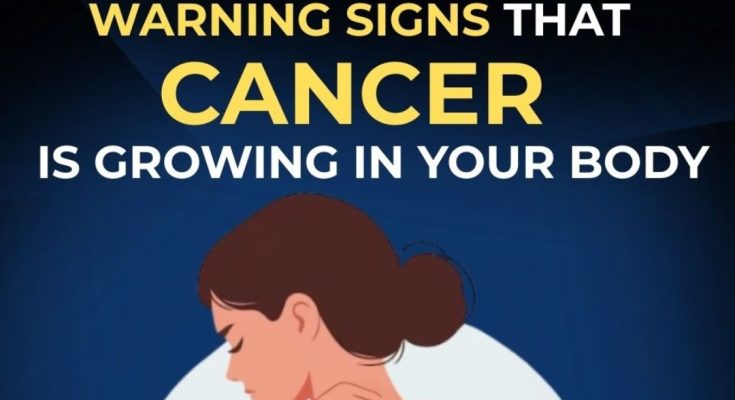Cancer is a complex and often silent disease, but recognizing early warning signs can make all the difference in treatment outcomes. While not every symptom listed below necessarily points to cancer, paying attention to your body and seeking medical advice when something feels off can save lives. Here are five key warning signs that may indicate cancer—and why early detection matters more than ever.
1. Unexplained Weight Loss
-
- What It Means : Losing weight without trying, especially if it’s significant (10 pounds or more), could be an early sign of certain cancers, such as pancreatic, stomach, esophageal, or lung cancer.
-
- Why It Happens : Cancer cells can interfere with normal metabolism, leading to unexplained weight loss. Additionally, some tumors release substances that affect appetite and digestion.
- What to Do : If you notice sudden, unintentional weight loss, consult a healthcare professional for further evaluation.
2. Persistent Fatigue
-
- What It Means : Feeling extremely tired or weak despite adequate rest might signal underlying issues, including blood-related cancers like leukemia or lymphoma.
-
- Why It Happens : Cancer and its treatments can cause fatigue by disrupting sleep patterns, reducing oxygen levels in the blood, or affecting hormone production.
- What to Do : If fatigue persists for weeks or interferes with daily activities, discuss it with your doctor to rule out serious causes.
3. Persistent Cough or Hoarseness
-
- What It Means : A cough that doesn’t go away after several weeks—or hoarseness that lasts longer than two weeks—could point to lung cancer, throat cancer, or other respiratory conditions.
-
- Why It Happens : Tumors in the lungs or airways can irritate tissues, leading to chronic coughing or changes in voice.
- What to Do : Seek medical attention if a persistent cough produces blood, worsens over time, or is accompanied by chest pain.
4. Changes in Bowel or Bladder Habits
-
- What It Means : Irregularities such as diarrhea, constipation, blood in stool, or difficulty urinating could indicate colorectal, bladder, or prostate cancer.
-
- Why It Happens : Tumors in the digestive or urinary tract can block passages, alter function, or cause bleeding.
- What to Do : Notify your doctor about any unusual bowel or bladder habits lasting more than a few days, especially if they’re accompanied by pain or blood.
5. Unusual Lumps or Swelling
-
- What It Means : Detecting a lump, bump, or swelling in areas like the breast, neck, armpit, groin, or abdomen could suggest the presence of a tumor.
-
- Why It Happens : Cancerous growths often manifest as palpable masses due to abnormal cell proliferation.
- What to Do : Perform regular self-exams and report any new or changing lumps to your healthcare provider immediately.
Why Early Detection Matters
Early detection significantly improves survival rates for many types of cancer. When caught early:
-
- Treatments are generally less invasive and more effective.
- The spread of cancer (metastasis) is minimized or prevented entirely.
- Patients have better quality of life during and after treatment.
However, delays in diagnosis remain a major obstacle. Many people ignore subtle symptoms or attribute them to less serious conditions, allowing cancer to progress undetected. Staying vigilant and prioritizing routine screenings can help catch potential problems before they become life-threatening.
Steps You Can Take Today
- Know Your Body : Pay attention to how you normally feel so you can recognize changes quickly.
- Schedule Regular Screenings : Follow recommended guidelines for mammograms, colonoscopies, Pap smears, and other preventive tests.
- Communicate Openly with Your Doctor : Don’t hesitate to share concerns or ask questions about persistent symptoms.
- Adopt Healthy Habits : Reduce risk factors like smoking, excessive alcohol consumption, poor diet, and lack of exercise.
- Educate Yourself : Learn about common warning signs associated with specific cancers based on age, gender, and family history.
Conclusion
While no one wants to think about cancer, understanding its warning signs empowers you to act swiftly if needed. Remember, most symptoms outlined here don’t automatically mean cancer—but ignoring them could lead to missed opportunities for timely intervention. By staying informed, proactive, and committed to early detection, we increase our chances of beating this formidable foe.
Your health is worth every ounce of vigilance—so listen to your body and seek care when necessary. Together, we can fight smarter against cancer. 🩺✨



